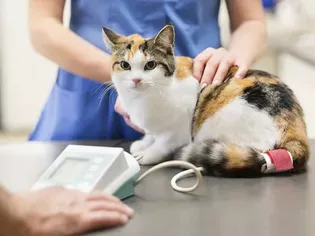Why Is My Cat Losing Weight?
Updated on 04/26/24

Why Is My Cat Losing Weight? A Comprehensive Guide to Identifying and Addressing Weight Loss in Cats
As loving cat owners, we often worry when we notice changes in our feline companions' behavior and appearance. One of the most concerning signs to watch out for is weight loss, which can be an indication of a variety of underlying health issues. Understanding the potential causes and taking prompt action is crucial for ensuring your cat's well-being.
This comprehensive guide will delve into the reasons why your cat may be losing weight and provide valuable tips for identifying and addressing the underlying cause effectively.
Common Causes of Weight Loss in Cats
Weight loss in cats can be attributed to numerous factors, each with its own unique characteristics and potential health implications. Some of the most prevalent causes include:
1. Dental Disease
Dental problems, such as gingivitis and periodontitis, can cause pain and discomfort in cats, making it difficult for them to eat. This reduced appetite leads to weight loss over time.
2. Parasites
Internal parasites, such as roundworms, hookworms, and tapeworms, can infest a cat's digestive tract and compete with it for nutrients. As a result, the cat doesn't receive adequate nourishment, leading to weight loss.
3. Hyperthyroidism
Hyperthyroidism is a condition in which the thyroid gland produces excessive thyroid hormones. This hormonal imbalance increases the cat's metabolism, causing weight loss despite increased appetite.
4. Diabetes
Diabetes is a disorder in which the body is unable to regulate blood sugar levels effectively. In cats, diabetes can lead to excessive urination and thirst, which can result in dehydration and weight loss.
5. Inflammatory Bowel Disease (IBD)
IBD is a chronic condition that causes inflammation in the digestive tract, leading to poor absorption of nutrients from food. This malabsorption can result in significant weight loss.
6. Cancer
Cancer can cause a variety of symptoms in cats, including weight loss. Tumors can interfere with digestion, appetite, or the body's ability to utilize nutrients.
7. Stress
Stressful situations, such as changes in the environment or household, can trigger weight loss in cats. Stress hormones can affect appetite and metabolism, leading to a reduction in food intake.
Additional Considerations
In addition to the aforementioned causes, other factors can contribute to weight loss in cats, including:
* Age: Senior cats may experience age-related changes in appetite and metabolism, leading to weight loss.
* Breed: Certain breeds, such as Siamese and Oriental Shorthairs, are known to be more prone to weight loss.
* Diet: A poor-quality diet lacking essential nutrients can lead to weight loss over time.
* Medications: Some medications, such as corticosteroids, can cause weight loss as a side effect.
Identifying the Underlying Cause
Determining the underlying cause of weight loss in your cat is crucial for providing appropriate treatment. A thorough veterinary examination is essential to rule out any underlying medical conditions. This examination may involve:
* Physical examination
* Blood tests
* Urine analysis
* Imaging tests (e.g., X-rays, ultrasound)
Treatment Options
The treatment for weight loss in cats varies depending on the underlying cause. Once the veterinarian has diagnosed the problem, they will recommend an appropriate treatment plan. This may include:
* Medical treatment: For conditions like hyperthyroidism or diabetes, medication is necessary to manage the underlying disease and prevent further weight loss.
* Parasite control: Deworming medications can eliminate intestinal parasites, improving nutrient absorption and promoting weight gain.
* Dental care: Addressing dental issues through teeth cleaning or extractions can resolve pain and discomfort, encouraging the cat to eat more.
* Dietary changes: Switching to a high-quality, nutrient-rich diet can help cats regain weight by providing them with the necessary calories and nutrients.
* Stress management: Identifying and reducing stressors in the cat's environment can help improve appetite and promote weight gain.
Monitoring and Prevention
Once treatment has been initiated, it's important to monitor your cat's weight closely to ensure that they are gaining weight steadily. Regular weigh-ins at home or at the veterinary clinic can help track their progress.
Preventing weight loss in cats involves maintaining a healthy lifestyle and addressing underlying health conditions promptly. Here are some preventive measures to consider:
* Provide a high-quality diet that meets your cat's nutritional needs.
* Ensure regular veterinary checkups to detect and treat any underlying medical issues early on.
* Control parasites through regular deworming.
* Manage stress by providing a stable and comfortable environment.
* Encourage regular exercise to maintain a healthy weight.
Conclusion
Weight loss in cats can be a sign of various underlying health issues. Understanding the potential causes and taking prompt action is crucial for ensuring your cat's well-being. By consulting with a veterinarian, identifying the underlying cause, and providing appropriate treatment, you can help your feline companion regain and maintain a healthy weight. Remember that prevention is always better than cure, so focus on providing your cat with a healthy lifestyle and addressing any concerns promptly to minimize the risk of weight loss.
Explore More Pets

Cat Behavior Problems
How to Stop Aggression in Kittens

Long-Haired Cat Breeds
Siberian Cat: Breed Profile, Characteristics, & Care

Cat Behavior Problems
How to Stop Kittens From Scratching and Biting

Long-Haired Cat Breeds
Turkish Angora: Cat Breed Profile, Characteristics & Care

Basic Training
How to Socialize Your Kitten

Short-Haired Cat Breeds
Cute Pictures & Facts About Calico Cats & Kittens

Litter Box Training
Training Your Kitten to Use the Litter Box

Long-Haired Cat Breeds
10 Fun Facts About White Cats